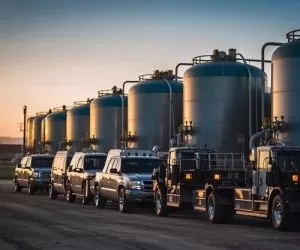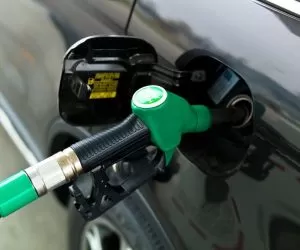
Sustainable Partnerships: How Gas Stations Can Collaborate with Local Farmers for Biofuel Production

Biofuels, such as ethanol and biodiesel, are renewable energy sources derived from organic matter like plants and animal waste. They offer significant environmental benefits by reducing greenhouse gas emissions compared to traditional fossil fuels. As the world moves towards cleaner energy solutions, gas stations and local farmers play a crucial role in the production and distribution of biofuels. This blog post will explore the importance of sustainable partnerships between these key players and how Protec Fuel, a leading ethanol fuel marketing and solutions company, can help facilitate these collaborations. With over two decades of experience and a unique turnkey ethanol solution, Protec Fuel is dedicated to providing services ranging from financial products and technical expertise to ethanol fuel for distributors, retailers, and fleets nationwide (source).
Biofuels: A Growing Demand
In recent years, the demand for renewable energy sources has grown exponentially due to increasing public awareness of climate change and the need for more environmentally friendly alternatives. Government policies and regulations, such as the Renewable Fuel Standard in the United States, have also played a significant role in driving biofuel adoption (source).
As a result, the market for biofuels is expanding rapidly, and companies like Protec Fuel are at the forefront of this transition. By providing turnkey ethanol solutions for businesses across the nation, Protec Fuel is committed to promoting renewable fuels and supporting the growth of this sector. By collaborating with local farmers and gas stations, the company helps create a more sustainable future for all.
Gas Stations: A Key Player in Biofuel Distribution
Gas stations are a critical link in the biofuel supply chain. As more consumers seek cleaner fuel options for their vehicles, gas stations need to adapt by offering ethanol-blended fuels such as E85, which consists of 85% ethanol and 15% gasoline (source). Protec Fuel plays a vital role in facilitating this shift by supplying ethanol to over two hundred retailers across the South, Southeast, and Mid-Atlantic areas. By partnering with Protec Fuel, gas stations can easily integrate ethanol into their product offerings and contribute to reducing emissions and promoting sustainability.
Local Farmers: The Backbone of Biofuel Production
Local farmers are essential in the biofuel production process, as they provide the feedstock necessary to create these renewable energy sources. Crops like corn, soybeans, and sugarcane are commonly used in the production of ethanol and biodiesel, offering an additional revenue stream for farmers while also contributing to environmental sustainability. By partnering with gas stations and companies like Protec Fuel, local farmers can play a pivotal role in creating a greener future for their communities.
Protec Fuel’s supply and logistics services support local farmers by ensuring the seamless flow of feedstock from farms to ethanol production facilities and finally to retail gas stations. This partnership not only benefits the environment but also boosts the local economy by providing jobs and promoting growth.
Creating Sustainable Partnerships
Collaboration between gas stations and local farmers is key to establishing a successful biofuel production and distribution network. By working together, these businesses can create a more sustainable and profitable energy industry, which benefits the environment and local economies alike. Some examples of successful partnerships include gas stations that source biofuels directly from nearby farms or collaborate with farmer cooperatives to ensure a consistent supply of feedstock.
Several factors should be considered when selecting local partners, such as the proximity of farms and gas stations, available resources, and shared goals for sustainability. Companies like Protec Fuel can provide guidance and support throughout the partnership process, ensuring that all parties benefit from their collaboration.
Steps to Establishing a Successful Partnership
- Identifying potential local farmer partners: Start by researching farmers in your area who produce biofuel feedstocks and express interest in collaborating on biofuel production.
- Assessing local feedstock availability and quality: Evaluate the availability of suitable crops and their potential for producing high-quality biofuels.
- Establishing contractual agreements and profit-sharing models: Negotiate terms that ensure a fair distribution of profits and responsibilities among all parties.
- Developing an efficient supply chain and logistics plan: Organize transportation and storage solutions for feedstock and finished biofuels, ensuring minimal waste and maximum efficiency.
- Implementing a marketing strategy to promote ethanol-blended fuels: Raise awareness of the environmental benefits of biofuels among potential customers and encourage their adoption.
- Integrating risk management measures: Protect your partnership against potential risks, such as fluctuating market prices or unexpected changes in crop yields. Protec Fuel’s expertise in fuel risk management can help partners navigate these challenges.
Challenges and Opportunities
While establishing sustainable partnerships between gas stations and local farmers can be an effective way to promote biofuel production, these collaborations often face challenges. Common issues include logistical hurdles, market fluctuations, and competition with traditional fossil fuels. By partnering with Protec Fuel, businesses can access the company’s expertise in overcoming these challenges and make the most of the opportunities presented by the growing biofuel market.
As the demand for renewable energy sources continues to rise, so do the prospects for growth and expansion in the biofuel sector. This presents a unique opportunity for gas stations and local farmers to work together to create a more sustainable energy infrastructure.

The Role of Protec Fuel in Facilitating Sustainable Partnerships
Protec Fuel is a leading wholesale distributor of ethanol-blended gasoline, offering a unique turnkey ethanol solution to distributors, retailers, and fleets across the nation. Their services are tailored to help businesses establish successful partnerships with local farmers and integrate biofuels into their product offerings.
By making use of Protec Fuel’s comprehensive range of services, including fuel risk management, supply and logistics, and profit strategies, gas stations and local farmers can establish a solid foundation for their collaboration. Additionally, Protec Fuel’s extensive network of retail partners, distributors, installers, and car manufacturers helps create a robust support system for sustainable biofuel partnerships.
For more information on how Protec Fuel can help your business establish a successful biofuel partnership, do not hesitate to reach out to their team by phone at 561-392-3667 or via email at [email protected]. Together, we can create a greener future for generations to come.
Supporting Local Economies Through Biofuel Partnerships
By fostering collaborations between gas stations and local farmers, biofuel production can greatly benefit local economies. This section will discuss the economic advantages of these partnerships and how they contribute to community development while promoting sustainability.
Job Creation and Economic Growth
Biofuel production has the potential to create jobs and stimulate economic growth in rural areas. For farmers, this partnership can lead to increased demand for their crops and the opportunity to diversify their income streams by selling feedstocks for biofuel production. Similarly, gas stations can benefit from an expanded customer base as more consumers seek renewable fuel options.
In addition to stimulating local economies directly, biofuel partnerships can spur growth in ancillary industries such as feedstock transportation, storage, and processing. As a result, the entire community can enjoy the economic benefits of these collaborations.
Strengthening Local Food Systems
By promoting biofuel production, sustainable partnerships between gas stations and local farmers can contribute to strengthening local food systems. When farmers dedicate a portion of their crops to biofuel production, they can help ensure a stable demand for their produce, enabling them to invest more in their farming operations. This increased investment can lead to more sustainable and resilient food systems, benefiting the local community as a whole.
Encouraging Community Investment in Sustainability
When gas stations and local farmers collaborate on biofuel production, they highlight the value of investing in sustainable practices at a community level. This commitment to sustainability can inspire other businesses and individuals in the area to adopt environmentally friendly practices, ultimately leading to a greener future for all.
As local economies see the success of these biofuel partnerships, they may be more inclined to support renewable energy infrastructure development and other eco-friendly initiatives in the future.
Conclusion
In conclusion, fostering partnerships between gas stations and local farmers for biofuel production not only contributes to a greener world but also significantly benefits local economies. By providing job opportunities, strengthening local food systems, and encouraging community investment in sustainability, these collaborations can improve the quality of life for all members of the community. With the support of companies like Protec Fuel, gas stations and local farmers can work together to drive economic growth and promote environmental sustainability in their communities.

Frequently Asked Questions (FAQ)
Q1: What are biofuels?
A1: Biofuels are renewable energy sources derived from organic matter like plants and animal waste. They offer significant environmental benefits by reducing greenhouse gas emissions compared to traditional fossil fuels.
Q2: Why is there a growing demand for biofuels?
A2: The demand for renewable energy sources has grown due to increasing public awareness of climate change, the need for more environmentally friendly alternatives, and government policies and regulations promoting renewable energy.
Q3: How do gas stations play a role in biofuel distribution?
A3: Gas stations are a critical link in the biofuel supply chain. By offering ethanol-blended fuels, they can contribute to reducing emissions and promoting sustainability. Protec Fuel helps gas stations integrate ethanol into their product offerings by supplying ethanol to retailers across the nation.
Q4: How do local farmers contribute to biofuel production?
A4: Local farmers provide the feedstock necessary to create biofuels, such as crops like corn, soybeans, and sugarcane. By partnering with gas stations and companies like Protec Fuel, local farmers can play a pivotal role in creating a greener future for their communities.
Q5: What are the benefits of sustainable partnerships between gas stations and local farmers?
A5: Sustainable partnerships between gas stations and local farmers result in successful biofuel production and distribution networks, benefiting the environment and local economies alike. Working together, these businesses can create a more sustainable and profitable energy industry.
Q6: How does Protec Fuel support sustainable biofuel partnerships?
A6: Protec Fuel is a leading wholesale distributor of ethanol-blended gasoline, offering a unique turnkey ethanol solution to distributors, retailers, and fleets across the nation. Their services, including fuel risk management, supply and logistics, and profit strategies, help businesses establish successful partnerships with local farmers and integrate biofuels into their product offerings.
Q7: How do biofuel partnerships benefit local economies?
A7: Biofuel production can create jobs, stimulate economic growth, strengthen local food systems, and encourage community investment in sustainability. Partnerships between gas stations and local farmers contribute to job creation, increased demand for locally grown crops, and the development of more sustainable and resilient food systems.





